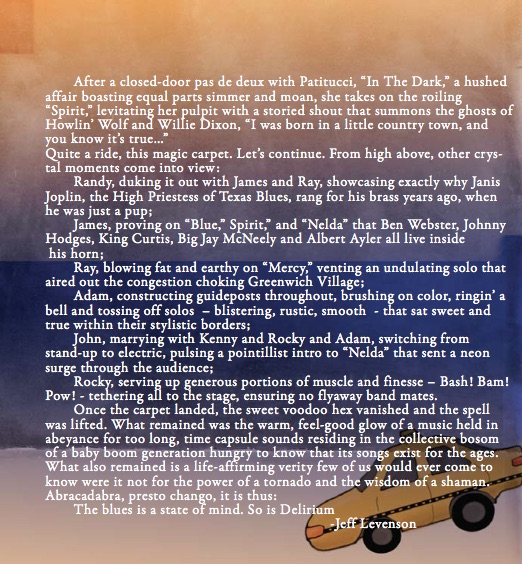BRIAN WILSON, SONGWRITER
In 1999, when Brian Wilson toured without the Beach Boys for the first time and made his celebrated “comeback” from years of reclusiveness and stage fright, he opened his New York show at the Beacon Theater with “The Little Girl I Once Knew.” An interesting choice, I thought, at the time. “The Little Girl…” is well known among Beach Boy enthusiasts; less so, among pop main-streamers. It is an unusually crafted song and record, distinguished by timely silences not favorable to mid-’60s radio programmers mandated to fill precious seconds with winning content. Here, on this special night, Wilson chose to re-launch himself with a song less connected to his reputation as hit-maker than songwriting craftsman.
This thought came to mind last month as I witnessed pianist Brad Mehldau at the Village Vanguard. Playing to a packed house (one of 12, throughout his week-long run), Mehldau bejeweled his set with a lesser-known Wilson composition, “Friends,” written 40-plus years ago in the period following the complex song constructions (and studio sessions) actuating the legendary Smile project.
When Mehldau and I chatted following the set, he received my comments on behalf of “Friends” and Brian Wilson warmly. “It’s an amazing tune,” he said, “because it seems so simple yet it’s got very cool chord changes. It’s a song you can dig into.”
Given his remarks I was reminded that over the years numerous jazz artists have tackled Wilson’s tunes: saxophonist Charles Lloyd earned accolades last year with Mirrors, which featured a pensive read of Wilson’s “Caroline No” (decades ago, Lloyd and the Beach Boys appeared on one another’s records); pianist Larry Goldings released an album named, In My Room, drawing parallels between his own artistic development and the title song’s ruminative air; guitarist Charlie Hunter and drummer Leon Parker waxed a duo version of “Don’t Talk (Put Your Head On My Shoulder”), a centerpiece of the Pet Sounds album; and Seamus Blake won the 2002 Thelonious Monk Competition with a Hail Mary pass amidst competing jazz tenorists – a poetic read of “God Only Knows,” considered by many to be Wilson’s finest composition.
The sum of these moments affirms an evolving verity in the narrative of music history – simply, that Brian Wilson is one of our Mount Rushmore composers. Having earned his stripes as an advanced studio alchemist, vocal arranger and conceptualizer – pop’s first great auteur – Wilson is being ushered into the songwriting spotlight by jazz artists. He is among an elite group of post-WW II tune-smiths whose work continues the traditions of the great American Songbook, even though their work was created primarily for radio and records, rather than film or theater. (He is joined in that regard by Joni Mitchell, Randy Newman, Paul Simon, James Taylor and Jimmy Webb, among others.)
Wilson’s contribution is as much sociological as it is musical. Given his developing years (he was born in 1942), he was a product of the dream state that fueled America’s western expansion. It held to a sweetness and optimism that proved mythical and came to define California. Wilson harnessed this and districted his own virtual geography, doing for the Golden State (and its associative mindsets) what Antonio Carlos Jobim did for Brazil, and George Gershwin did for New York. His music branded a sense of place.
Now, as news circulates that the Beach Boys will be embarking on a 50th Anniversary tour, featuring a core group of litigious band members who have functioned independently yet spread Wilson’s foundational work, we can see more clearly Brian Wilson, Songwriter. Last year he released …Re-imagines Gershwin; this year, it’s In The Key of Disney, a signature collection of treatments covering tunes associated with the Disney film archives.
The compositions on those albums are not his, but they bring him full circle, In 1961, inspired by “Rhapsody In Blue” and “When You Wish Upon A Star,” he believed that he too could write. His inaugural effort was “Surfer Girl,” which established an emotional template heard throughout his long career. Its wordless intro - the longing, melancholy, ache - provides all you need to know about Brian Wilson and, perhaps, ourselves: The dreams beyond reach are those worth chasing.
- by Jeff Levenson




